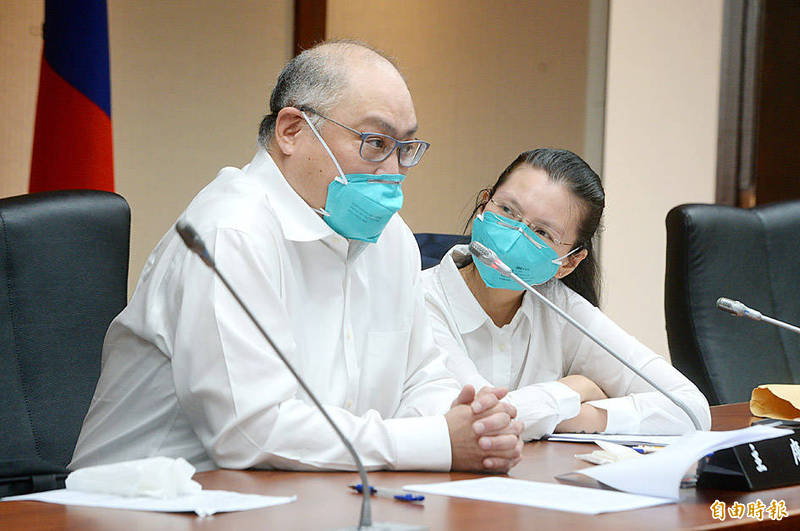《TAIPEI TIMES》 Lee Ming-che talks about jail time in Chishan

Taiwanese human rights advocate Lee Ming-che, left, and his wife, Lee Ching-yu, speak to reporters in Taipei yesterday. Photo: Wang Yi-sung, Taipei Times
PUBLICIZED RESCUE: The human rights advocate said his wife, NGOs and the media were to thank for his release; without their help he might have served longer
By Shelley Shan / Staff reporter
Taiwanese human rights advocate Lee Ming-che (李明哲) yesterday said that he had endured physical and psychological abuse during his five-year imprisonment in China, adding that he would not have been able to return to Taiwan if it were not for the rescue plan organized by his wife, Lee Ching-yu (李凈瑜), veteran political activist Shih Ming-te (施明德), Shih’s wife, and nongovernmental organizations (NGOs).
Lee Ming-che was arrested by the Chinese government after he entered China via Macau on March 19, 2017. In November of that year, he was sentenced to five years in prison and deprived of political rights for two years for allegedly subverting state power.
He was released on April 14 after finishing his prison sentence and returned to Taiwan the next day.
Yesterday, after he had been released from COVID-19 quarantine, Lee Ming-che and Lee Ching-yu attended a news conference at the Legislative Yuan.
The couple bowed, thanking domestic and international news outlets for reporting on the advocate’s plight over the past five years, and expressing their appreciation for the care and assistance they received from NGOs, and especially from Shih and his wife.
Lee Ming-che told reporters that he — a second-generation Chinese born in Taiwan — became involved in democratic and human rights issues when he read about and researched the 228 Incident and other significant events and figures shaping the history of Taiwan.
He later became concerned about the plight of Chinese human rights advocates.
“As a Taiwanese, I knew there were two things I could do to help them: providing financial assistance to political prisoners in China and their family members using a nonprofit fund we created online, and sharing online stories of Taiwanese in their pursuit of democracy,” he said.
“I did all this out of my conviction for human rights and humanitarianism. I believe I did not cross any political red line as a Taiwanese... All I did was use my credit cards to buy books and basic life necessities for political prisoners and their families,” he said.
However, the Chinese government viewed his humanitarian aid as a subversion of state power, he said, adding that he was immediately taken into custody upon entering China’s Guangdong Province.
The way the Chinese police arrested and interrogated him was no different from how the Chinese Nationalist Party (KMT) government treated political dissidents during the White Terror Era, he added.
Aside from being forced to make a confession that he intended to subvert state power, for which he later pleaded guilty in a staged trial, Lee Ming-che said he refused to plead guilty to a charge of espionage, as he could not betray Taiwan.
“If it were not for the highly publicized rescue plan organized by my wife and NGOs, I could have served a longer sentence, even life,” he said, adding that he only pleaded guilty to the charge of subversion because he wanted to go home, not because he had done something wrong.
Lee Ming-che said that he was imprisoned with serious criminals in Hunan Province’s Chishan Prison, where all prisoners must perform forced labor.
“We left the prison daily at about 6am and did not return until 6pm or 7pm. This contravened China’s Prison Act, which limits work hours for prisoners to eight hours per day, or at the most nine hours if necessary,” he said. “Prisoners do not have holidays, except for four days during the Lunar New Year holiday.”
The prison management forced the prisoners to sign their names on forged time sheets, and served them food with tainted oil, he said, adding that the prison amounted to a sweatshop.
Conditions did not improve until his wife helped expose the situation, he said.
“Prisoners in my zone were eventually given one day free from work per week and had hot water for showers in the winter. Unlike other prisoners, I did not have the pressure of work and was taken to a hospital for a health exam every year,” he said.
However, prison guards banned other prisoners from speaking to him during the last year of his imprisonment, he said.
He was quarantined in a hospital for two months because of COVID-19 before he was released on April 14.
Unlike Lee Ming-che, Taiwanese businessman Lee Meng-chu (李孟居) has spent 18 months in prison on espionage charges, has been unable to return to Taiwan and was also deprived of political rights for two years.
“I think our endings were different because we had different rescue plans. His family did not want the government to intervene and tried to settle the matter privately... You cannot keep a rescue plan ‘low profile,’ otherwise you are giving the Chinese government the license to do whatever it wants,” Lee Ming-che said.
Lee Ming-che also had a word of advice for Taiwanese in China.
“Probably nothing will happen to you if you are there to do business and make money, but if you are there to advocate for human rights or other causes, you should reassess your personal safety and pray that you have someone like my wife to rescue you when you are in trouble,” he said.
新聞來源:TAIPEI TIMES















